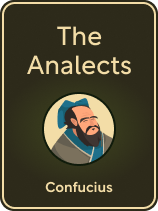

This article is an excerpt from the Shortform book guide to "The Analects" by Confucius. Shortform has the world's best summaries and analyses of books you should be reading.
Like this article? Sign up for a free trial here.
What is shu? How can it guide your behavior in life? What’s Confucius’s recipe for morality?
For Confucius, virtue is paramount in life. The Analects contain practical advice for how to become a good person. Confucius discusses the principle of shu, and he shares four more qualities you should embody if you want to be a force for good in the world.
Keep reading to learn the Confucian way of morality.
Confucius on Virtue
According to Confucius, virtue is guided principally by shu. So, what is shu? This Chinese word essentially means don’t do to others what you wouldn’t want to be done to you.
(Shortform note: Shu seems to be a fairly straightforward concept, but there’s debate about how to translate the word itself. Some scholars say that it means self-reflection—you imagine yourself in others’ positions, “reflecting” yourself onto them and thereby developing empathy. Others translate it as reciprocity, saying that shu refers to the relationship between yourself and others; if you treat others well then they will treat you well, and, if you treat them poorly, then they’ll treat you poorly. Other translations of shu include respect, deference, and altruism.)
However, while shu is a good foundation for moral behavior, Confucius adds that causing no harm isn’t enough to be a truly good person. Rather, a good person is someone who’s respectful, honest, hardworking, and kind. In other words, to be a good person, you must do your best to make the world a better place.
We’ll highlight four of Confucius’s insights on how to be a good person.
Hard Work
Confucius conveys that working hard is part of being a good person. He adds that putting forth your best effort has personal benefits, so there are reasons for even a selfish person to do so. Hard work will bring you satisfaction—namely, if you always do your best, then you’ll be satisfied with your efforts regardless of their outcomes. On the other hand, if you don’t give your best effort, you’ll feel unsettled and guilty because you’ll know that you could have done more.
Confucius also advises you to adjust your life so that you can do your best. This could mean changing where you live, where you work, who you spend time with, or anything else—if something gets in the way of you living well and doing your best work, it’s not worth holding on to.
Honesty
Confucius teaches that honesty is another key part of proper conduct—a good person must be trustworthy. When Confucius discusses honesty, he doesn’t just mean not telling lies. You should also try to be honest in your thoughts. In other words, avoid unfair biases; strive to see people, things, and situations as they are instead of as you expect (or want) them to be.
Honesty also means being frank about your skills and knowledge: Don’t inflate your abilities, but don’t sell yourself short, either. In short, know your own worth and be honest about it.
To avoid accidentally telling lies, Confucius recommends not talking about your plans or goals because you’ll be ashamed if your actions don’t live up to your words. Instead, take action first, and only talk about it afterward.
Finally, Confucius says that an honest person must avoid hypocrisy. He suggests that you ask yourself at the end of each day whether you gave any advice that you don’t personally follow. If so, change either your actions or your teachings so that you can avoid such hypocrisy in the future.
Altruism
Since Confucius defines a good person as someone who strives to improve the world, he believes that good people must be altruistic: They act to help others rather than for personal gain. Confucius describes this using the Chinese word ren, translated as “humaneness” or “humanity.” For him, ren means always striving to live up to the moral standards he sets throughout the Analects, no matter what. He says that good people would rather die than compromise their morals.
Confucius also offers two concrete suggestions for living altruistically. First, should you find yourself in an unfair or immoral culture, it’s acceptable to say whatever you must to protect yourself—but under no circumstances should you do anything immoral or cruel. Have the courage to live by your values at any cost.
Second, frugality is another important aspect of altruism. Since altruism is the opposite of selfishness, altruistic people try not to take more than they need. They’re happy to live modestly, with a small home and simple food. Confucius says obsessing over material goods when you already have enough to live on is a waste of energy that would be better spent helping others.
Effortless Action
Confucius teaches that, for good people, proper conduct seems effortless—they simply know the right thing to do and do it. For that reason, he considers effortless action to be proof of good moral character. To describe this concept, he uses the term wuwei, a Chinese word that can mean action without effort or simply inaction.
Effortless action seems to go against the earlier principle of hard work, but that’s because the work of wuwei is internal and therefore invisible to others. In other words, instead of struggling to do the right thing (external, visible effort), you struggle to turn yourself into the kind of person who always does the right thing (internal, invisible effort).
One of the main benefits of effortless action is that it keeps you focused on things you can control: namely, the internal, invisible effort of shaping your actions and qualifications.

———End of Preview———
Like what you just read? Read the rest of the world's best book summary and analysis of Confucius's "The Analects" at Shortform.
Here's what you'll find in our full The Analects summary:
- A collection of Confucius's teachings compiled by his students
- Lessons about how to be a good learner, person, and leader
- Concrete methods for putting Confucius’s teachings into practice






